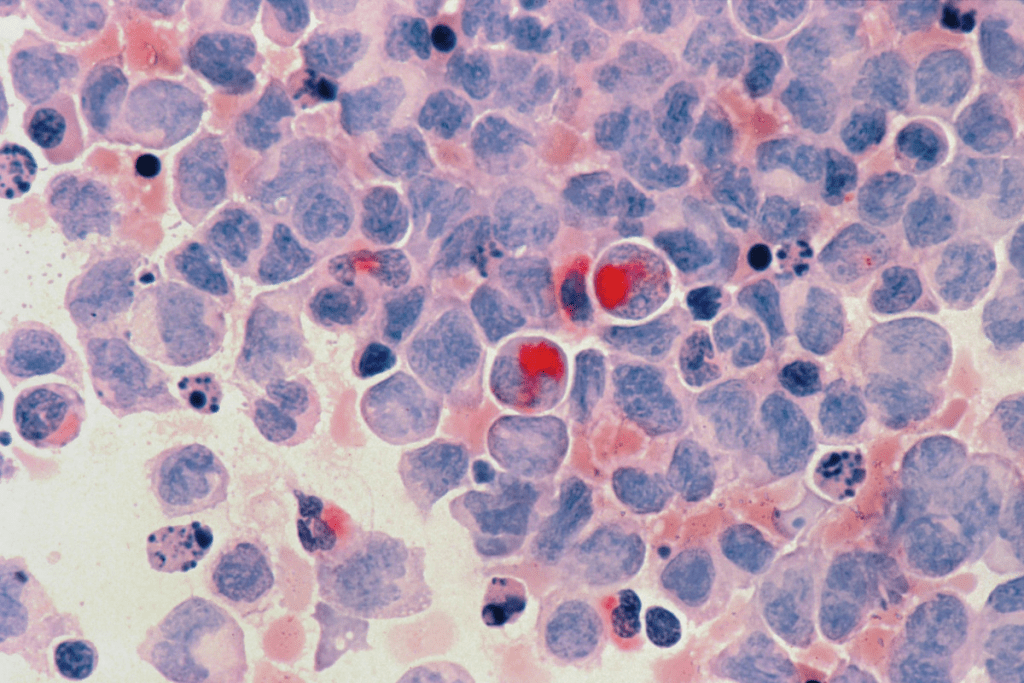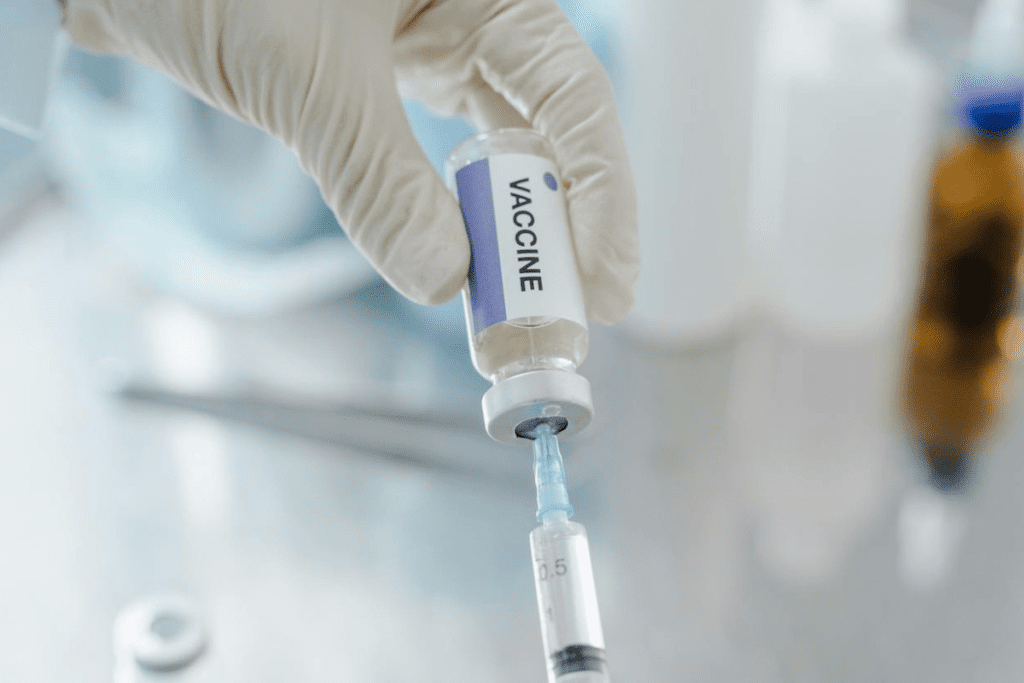Last Updated on November 12, 2025 by

Gene therapy is a new hope for cancer patients. It changes a patient’s genes to help the immune system fight cancer. This method is very promising.
Even though gene therapy is not a cure for all cancers yet, it’s showing great promise. We’ll look at where it stands in cancer treatment and its possible benefits.
The fight against cancer is ongoing, with current treatments facing big challenges. Cancer is a leading cause of death worldwide. The burden is expected to grow in the coming years.
The American Cancer Society predicts over 2 million new cancer cases in the US in 2025. Globally, cancer deaths are expected to exceed 9 million in the same year. These numbers show we need effective treatments now.
There’s a rise in cancer cases due to aging and lifestyle changes. The global numbers highlight the need for new treatments, like gene therapy in cancer.

Traditional treatments like chemotherapy and radiation have been key for decades. But they have big limitations.
These issues show we need new approaches, like gene therapy. Gene therapy targets the genetic roots of cancer.
We’re moving towards a future where gene therapy could be a main treatment for cancer. Gene therapy’s vast promise is being explored to overcome traditional therapy limits.
Gene therapy is a new way to treat diseases by changing genes. It could change how we fight cancer and other illnesses.

Gene therapy changes a person’s genes to treat diseases. It adds, removes, or changes genes in cells to fight diseases. It can reduce or alter toxic proteins or add new proteins to help the immune system.
There are different types of gene therapy:
The gene therapy process has several steps:
Gene therapy can treat diseases by replacing a faulty gene or introducing a new gene. Experts say it could treat many diseases, including cancer.
“Gene therapy is a rapidly evolving field that holds great promise for the treatment of various diseases. By modifying genes, we can potentially cure genetic disorders and improve the quality of life for patients.”
Gene Therapy Researcher
Gene therapy has made big strides. It started in the 1960s, but real trials began in the 1990s. Now, we see many clinical trials and approved treatments.
Important milestones include new vectors for gene delivery and CRISPR improvements. These advancements have helped gene therapy grow.
As research goes on, gene therapy is becoming key in fighting cancer and other diseases. We’re moving towards a future where it could be a common treatment.
Gene therapy is changing how we treat cancer, bringing hope to patients everywhere. It offers new ways to target cancer cells better than old treatments. This means fewer side effects for patients.
CRISPR-edited T cell therapies are a big step forward in cancer treatment. Scientists use CRISPR to make T cells better at finding and killing cancer cells. This method is showing great promise in clinical trials, possibly leading to cures for some cancers.
A leading gene therapy expert believes in CRISPR-edited T cell therapies. He says they could change cancer treatment by being more precise and effective.
“The future of cancer treatment lies in gene editing technologies like CRISPR, which can be used to modify T cells to recognize and attack cancer cells more effectively.”
CAR T-cell therapy is another key gene therapy for cancer. It makes a patient’s T cells find and kill cancer cells by adding a special receptor. The FDA has approved it for some blood cancers, and it’s shown to work well in making patients cancer-free.
The success of CAR T-cell therapy is opening doors for more gene-based cancer treatments. As research grows, we’ll see even more new ways to fight cancer.
There are other gene-based treatments for cancer, too. For example, oncolytic virus therapy uses viruses to kill cancer cells. Gene editing is also being explored to fix genes that cause cancer.
As research keeps improving, we’ll see more gene therapy options in clinical trials. Gene therapy is a key part of the fight against cancer, giving us hope for the future.
The field of gene therapy is seeing a lot of new research and trials. This is giving cancer patients new hope. Recent studies have shown promising results, which could lead to better cancer treatments.
A study at the University of Minnesota found great success with gene-edited T cells. They were used to treat end-stage cancer patients. The study showed that cancer stopped growing in most patients, and one patient even got better completely.
Key findings from the University of Minnesota study include:
Researchers at the University of California, San Francisco (UCSF) are working on glioblastoma treatment. Glioblastoma is a very aggressive brain cancer with few treatment options. The UCSF study is looking for new ways to fight this tough disease.
As noted,
“Gene therapy offers a promising approach to treating glioblastoma, a disease that has historically been difficult to manage.”
The landscape of gene therapy clinical trials for cancer is changing fast. Researchers at places like MD Anderson are creating more gene therapies. They are making these therapies available through their clinical trial programs. This is important for learning more about and treating different cancers.
Ongoing clinical trials are focusing on:
As we see more breakthroughs in gene therapy research, the future for cancer treatment looks bright. With ongoing trials and new technologies, we are getting closer to better and more targeted treatments for cancer patients all over the world.
Gene therapy has brought hope to many cancer patients. It has shown great results in those with end-stage cancer. This treatment offers a second chance at life for those who have tried everything else.
Gene therapy has amazed us with its ability to cure end-stage cancer. CAR T-cell therapy is leading this breakthrough. A study in a top medical journal showed a patient with advanced lymphoma went into complete remission after CAR T-cell therapy.
“The response to CAR T-cell therapy in our patients has been nothing short of remarkable, with many experiencing complete remission.” – Oncologist
CAR T-cell therapy works by making a patient’s T-cells attack cancer cells. This personalized treatment has shown great promise in trials. Some patients have stayed cancer-free for a long time.
Gene therapy does more than just cure cancer. It also makes patients’ lives better. It reduces tumors and eases symptoms, helping patients get stronger and do everyday things again. A study at a top cancer research center found patients’ well-being greatly improved after gene therapy.
These benefits aren’t just for patients. They also help families and caregivers, spreading hope and strength.
As gene therapy keeps improving, we’ll see more amazing stories. These will show its growing role in fighting cancer.
Gene therapy is promising but faces many challenges for cancer treatment. It’s important to know the obstacles that limit its success.
Delivering genetic material to cancer cells is a big technical challenge. Viral vectors are often used but have their limits. They can’t always target the right cells and avoid the immune system. Also, the efficiency of gene editing tools like CRISPR/Cas9 can vary, and there’s a risk of off-target effects.
New methods like nanoparticles are being explored. They might solve some of these problems. But, we need better and more precise delivery systems.
Safety is a top concern in gene therapy. There’s a risk of the virus causing infection again. Also, immune reactions to viral vectors can cause inflammation and other problems. It’s vital to ensure gene therapy is safe in the long term.
To make gene therapy safer, researchers are working on better vectors and protocols. They’re looking at new delivery methods and how gene therapy affects the immune system.
Cancer cells can develop resistance to gene therapy. This is a big challenge. They can change through genetic mutations that make the therapy less effective. It’s key to understand these mechanisms to find ways to beat them.
Scientists are searching for biomarkers to predict resistance. They’re also exploring combination therapies to overcome resistance. By tackling these challenges, we can make gene therapy more effective against cancer.
Gene therapy in oncology is making rapid strides thanks to genetic engineering. By early 2025, it will make up 57% of new oncology trials. This shows a big leap in clinical research. Experts are working hard to create new gene therapies and enhance the ones we have.
Several new technologies are set to change gene therapy in cancer treatment. CRISPR-Cas9 gene editing is one of the most exciting. It lets us make precise changes to the genome. This could fix genetic issues that lead to cancer, opening up new treatment options.
Another technology gaining attention is CAR T-cell therapy. It involves changing a patient’s T cells to fight cancer. This method has shown great promise in treating blood cancers.
By 2030, we foresee big changes in gene therapy for cancer. More gene therapies will get approved for different cancers. This will happen thanks to ongoing trials and better gene editing tools.
We also think gene therapy will get more personal. Treatments will be made just for each patient, based on their genes. This should lead to better results and fewer side effects.
Looking ahead, gene therapy will be key in fighting cancer. With ongoing research and tech improvements, we’re hopeful about its future. It has the power to greatly improve patient care and save lives.
Gene therapy is a new hope for cancer patients worldwide. It’s important to compare its benefits and side effects with traditional treatments. This helps us understand its role in fighting cancer.
Gene therapy is showing great promise in treating some cancers. CAR T-cell therapy, a type of gene therapy, has been very effective. Studies show that it can lead to complete remission in 50% to 90% of patients, depending on the cancer type.
Traditional treatments like chemotherapy and radiation work for many cancers. But, they might not work as well for all. A study found that chemotherapy works for 30% to 50% of patients. Gene therapy, being more targeted, might work better for some.
“The future of cancer treatment lies in personalized therapies like gene therapy, which have the power to change how we fight this disease.”
oncologist
Gene therapy might have fewer side effects than traditional treatments. Chemotherapy and radiation can harm healthy cells. But gene therapy targets cancer cells more precisely. Patients often face fewer side effects like hair loss, nausea, and fatigue, compared to traditional treatments.
The length of gene therapy treatment varies. But it often involves just one treatment or a few sessions. This is different from chemotherapy or radiation, which can take longer.
Recovering from gene therapy can be easier. It aims for a lasting solution. Patients may enjoy longer periods of remission or even a complete cure, reducing the need for ongoing treatment.
In summary, gene therapy is a strong alternative to traditional cancer treatments. It offers better results, fewer side effects, and a simpler treatment process. As research improves, gene therapy will become more vital in the fight against cancer.
Gene therapy is seen as a hopeful cancer treatment. But worries about its cost and who can get it are growing. We’ll look at the price tags and how to make it more affordable, including insurance and financial help.
The price of gene therapy is a big problem for many. It can cost between $373,000 and over $1 million per treatment. This high cost comes from the complex research and making each treatment unique for each patient.
Creating gene therapy takes a lot of research and manufacturing. Because it’s made for each person, it’s even more expensive.
But, there are ways to make gene therapy more reachable. Many insurance providers are starting to cover it for some conditions. Yet, what’s covered can change a lot.
For those without good insurance, financial help programs are a lifeline. These programs, from gene therapy makers or non-profits, can lessen the financial load on families.
Finding your way through these options can be tough. So, it’s key for patients to work with their doctors and financial advisors. Together, they can find ways to get gene therapy.
Gene therapy offers hope for cancer patients but raises complex ethical questions. We must discuss these concerns as we advance in this field. It’s important to ensure that modifying human genes is safe and fair for everyone.
Changing a patient’s genetic information is a major ethical issue. It makes us wonder about long-term safety and possible side effects. For example, CRISPR technology is new and raises debates about its accuracy and risks.
A study on NCBI highlights the need to understand gene editing risks for safe use.
The ethical sides of genetic changes in cancer treatment are complex:
Ensuring fair access to gene therapy is another big issue. The high cost and complexity of these treatments block access for many. We need to find ways to make gene therapy available to all, including:
By tackling these ethical issues, we can make gene therapy fair and safe for cancer patients everywhere.
Gene therapy is a new way to fight cancer. It’s a big step for those who have tried everything else. It offers hope for a cure.
It’s key for patients to understand gene therapy. They should know how it fits into their treatment. For more info, check out the ACGT Foundation. They share the latest research and trials.
Not everyone can get gene therapy. It depends on the cancer type, stage, and treatments tried before. Patients should talk to their oncologist about if they qualify. This includes genetic markers and protein expressions on cancer cells.
When thinking about gene therapy, ask your oncologist important questions. Here are some:
Being informed helps patients make better choices. Gene therapy is changing fast. Keeping up with new info is vital for those considering it.
Gene therapy is changing how we treat cancer. It can target and kill cancer cells, giving hope to patients and doctors. The field is growing fast, with new discoveries and improvements coming often.
We’ve looked at different gene therapy methods, like CRISPR-Edited T Cell Therapies and CAR T-Cell Therapy. These treatments are showing great results. Some patients have seen their cancer go away, and their quality of life has improved.
Even though there are challenges, the future of gene therapy in fighting cancer looks bright. New technologies and future developments will make these treatments even better. We need to work on making these treatments affordable and accessible to everyone.
In short, gene therapy is set to change cancer treatment for the better. We’re excited about its ability to help patients and look forward to more progress in this field.
Gene therapy changes a patient’s genes to treat diseases. In cancer, it adds new genes to cells. This helps the immune system fight cancer cells.
Gene therapy for cancer includes CRISPR-edited T cells and CAR T-cell therapy. These methods have shown great promise.
Gene therapy can improve treatment results and reduce side effects. It also helps patients live better lives.
Gene therapy faces technical hurdles and safety worries. It also struggles with tumor resistance. These issues must be solved for it to work well.
Gene therapy is a new way to fight cancer. It might be more effective and have fewer side effects. Treatments could also be shorter.
Gene therapy is expensive, making it hard for some to access. Insurance and financial help can make a difference.
Gene therapy raises ethical questions. There are worries about genetic changes and fair access. These must be addressed responsibly.
Patients should learn about gene therapy’s benefits and risks. They should also know who can get it and what to ask their doctor.
Gene therapy is growing fast. New technologies and research will likely improve it. This offers hope for cancer patients.
Yes, many trials are testing gene therapy for cancer. They include studies on T cell therapy and glioblastoma. The results are encouraging.
Subscribe to our e-newsletter to stay informed about the latest innovations in the world of health and exclusive offers!